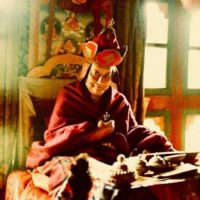When anger arises in what we think of as our minds, we become oblivious even to the dangers that might threaten us. Our faces flushed with rage, we seize our weapons and could even kill a lot of people. But this anger is an illusion; it is not at all some great force that comes rushing into us. It achieves one thing only and that is to send us to hell, and yet it is nothing but thought, insubstantial thought. It is only thought, and yet!
At this moment, while I am teaching Dharma, let us consider the mental experience, or thought, which you have, of listening carefully to me. Does this have a form or color? Is it to be found in the upper or lower part of the body, in the eyes or the ears?
What we call the mind is not really there at all. You can find out whether the mind exists or not by just turning inwards and reflecting carefully. You will see that the mind does not begin, or end, or stay, anywhere; that it has no color or form and is to be found neither inside nor outside the body. And when you see that it does not exist as any thing, you should stay in that experience without an attempt to label or define it.

Dilgo Khyentse Rinpoche
from the book Enlightened Courage: An Explanation of the Seven-Point Mind Training
Read a random quote or see all quotes by Dilgo Khyentse Rinpoche.
Further quotes from the book Enlightened Courage:
- Failing to use the instructions as an antidote
- The three essential factors on which the accomplishment of the Dharma depends
- The vows of the Mind Training
- Well rewarded
- Begin the training sequence with yourself
- Bodhicitta practice
- Give up hoping for results
- Delusion
- Forsaking all self-centeredness
- Honest examination
- The degree of self-clinging
- Morning pledge
- The impurity of our perception
- Using illness on the path
- Antidote to our ego-clinging
- Taking advantage of suffering
- All Dharma has a single goal
- Always be sustained by cheerfulness
- Signs of realization